60 items found
Page 1 of 1
-
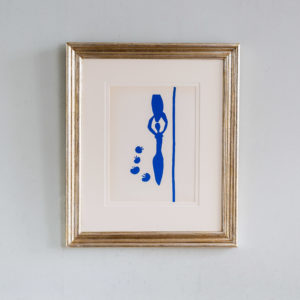
Henri Matisse, Nu Bleu I
£1,750 eachHenri Matisse, Nu Bleu I
The foreword states: 'This double number of Verve is entirely dedicated to the last works of Matisse - 1950-1954. Reproduced in colour lithography, these works have been realised by the artist with papers coloured in gouache, cut with scissors and pasted. They are shown here with drawings executed at the same time or during the preceding period. Matisse composed the cover specially for this volume. These first lithographic plates were printed during the year 1954 under his direction. The printing of the lithographs in colour by Mourlot Frères and that of the photogravure reproductions and the typography by the master printers Draeger Frères, was completed in Paris on the 28th day of July 1958.'£1,750 each -
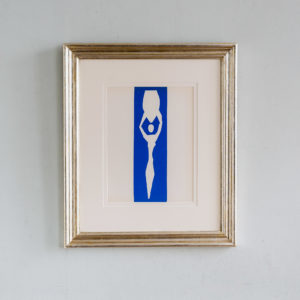
Henri Matisse, Nu Bleu II
£1,750 eachHenri Matisse, Nu Bleu II
The foreword states: 'This double number of Verve is entirely dedicated to the last works of Matisse - 1950-1954. Reproduced in colour lithography, these works have been realised by the artist with papers coloured in gouache, cut with scissors and pasted. They are shown here with drawings executed at the same time or during the preceding period. Matisse composed the cover specially for this volume. These first lithographic plates were printed during the year 1954 under his direction. The printing of the lithographs in colour by Mourlot Frères and that of the photogravure reproductions and the typography by the master printers Draeger Frères, was completed in Paris on the 28th day of July 1958.'£1,750 each -
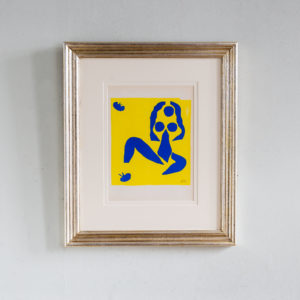
Henri Matisse, Nu Bleu IV
£1,750 eachHenri Matisse, Nu Bleu IV
The foreword states: 'This double number of Verve is entirely dedicated to the last works of Matisse - 1950-1954. Reproduced in colour lithography, these works have been realised by the artist with papers coloured in gouache, cut with scissors and pasted. They are shown here with drawings executed at the same time or during the preceding period. Matisse composed the cover specially for this volume. These first lithographic plates were printed during the year 1954 under his direction. The printing of the lithographs in colour by Mourlot Frères and that of the photogravure reproductions and the typography by the master printers Draeger Frères, was completed in Paris on the 28th day of July 1958.'£1,750 each -
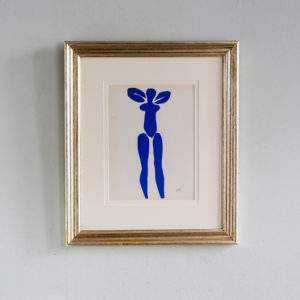
Henri Matisse, Nu Bleu X
£1,750 eachHenri Matisse, Nu Bleu X
The foreword states: 'This double number of Verve is entirely dedicated to the last works of Matisse - 1950-1954. Reproduced in colour lithography, these works have been realised by the artist with papers coloured in gouache, cut with scissors and pasted. They are shown here with drawings executed at the same time or during the preceding period. Matisse composed the cover specially for this volume. These first lithographic plates were printed during the year 1954 under his direction. The printing of the lithographs in colour by Mourlot Frères and that of the photogravure reproductions and the typography by the master printers Draeger Frères, was completed in Paris on the 28th day of July 1958.'£1,750 each -
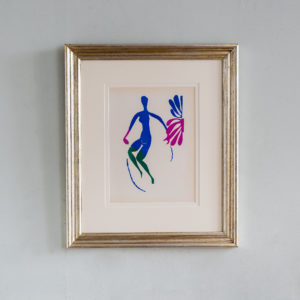
Henri Matisse, Nu Bleu V
£1,750 eachHenri Matisse, Nu Bleu V
The foreword states: 'This double number of Verve is entirely dedicated to the last works of Matisse - 1950-1954. Reproduced in colour lithography, these works have been realised by the artist with papers coloured in gouache, cut with scissors and pasted. They are shown here with drawings executed at the same time or during the preceding period. Matisse composed the cover specially for this volume. These first lithographic plates were printed during the year 1954 under his direction. The printing of the lithographs in colour by Mourlot Frères and that of the photogravure reproductions and the typography by the master printers Draeger Frères, was completed in Paris on the 28th day of July 1958.'£1,750 each -
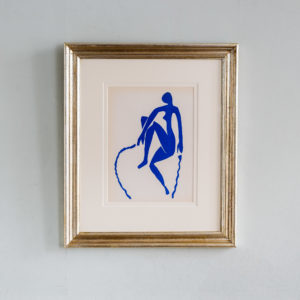
Henri Matisse, Nu Bleu VIII
£1,750 eachHenri Matisse, Nu Bleu VIII
The foreword states: 'This double number of Verve is entirely dedicated to the last works of Matisse - 1950-1954. Reproduced in colour lithography, these works have been realised by the artist with papers coloured in gouache, cut with scissors and pasted. They are shown here with drawings executed at the same time or during the preceding period. Matisse composed the cover specially for this volume. These first lithographic plates were printed during the year 1954 under his direction. The printing of the lithographs in colour by Mourlot Frères and that of the photogravure reproductions and the typography by the master printers Draeger Frères, was completed in Paris on the 28th day of July 1958.'£1,750 each -

The Dance, by Henri Matisse, Jan – March 1939 / No. 4.
£1,200The Dance, by Henri Matisse, Jan – March 1939 / No. 4.
The Verve Review was a purposefully luxurious. It ran from 1937 to 1960, but with only 38 editions available, due to the high degree of design and editorial work dedicated to each issue. Each edition contained unique lithographic prints, commissioned by the editor, and each cover a double-page lithograph elaborated by one of the artists contained within. It was the brainchild of its editor Stratis Eleftheriades, a Greek National who moved to Paris in the early thirties to take part in the growing Modernist movement, writing under the name of Teriade.£1,200 -
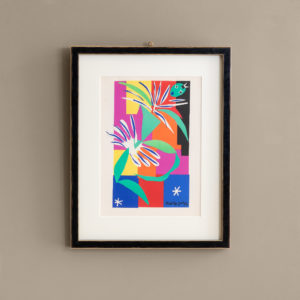
Henri Matisse, ‘The Last Works of Henri Matisse’
£900 eachHenri Matisse, ‘The Last Works of Henri Matisse’
From Verve Vol. IX No. 35/36 published by Tériade under the title 'The Last Works of Henri Matisse'£900 each -
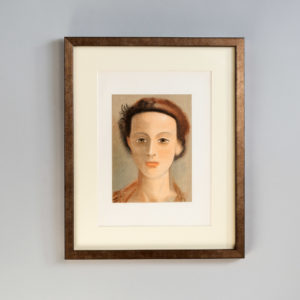
Portrait by Andre Derain, Verve Vol 2 / No. 5-6.
£800Portrait by Andre Derain, Verve Vol 2 / No. 5-6.
The Verve Review was a purposefully luxurious. It ran from 1937 to 1960, but with only 38 editions available, due to the high degree of design and editorial work dedicated to each issue. Each edition contained unique lithographic prints, commissioned by the editor, and each cover a double-page lithograph elaborated by one of the artists contained within. It was the brainchild of its editor Stratis Eleftheriades, a Greek National who moved to Paris in the early thirties to take part in the growing Modernist movement, writing under the name of Teriade.£800 -
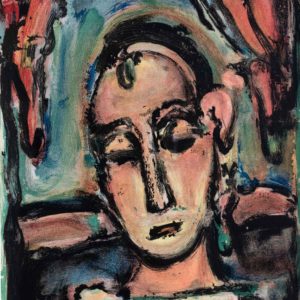
Head of a Girl by George Rouault, Verve Vol 2 / No. 5-6.
£800Head of a Girl by George Rouault, Verve Vol 2 / No. 5-6.
The Verve Review was a purposefully luxurious. It ran from 1937 to 1960, but with only 38 editions available, due to the high degree of design and editorial work dedicated to each issue. Each edition contained unique lithographic prints, commissioned by the editor, and each cover a double-page lithograph elaborated by one of the artists contained within. It was the brainchild of its editor Stratis Eleftheriades, a Greek National who moved to Paris in the early thirties to take part in the growing Modernist movement, writing under the name of Teriade.£800 -
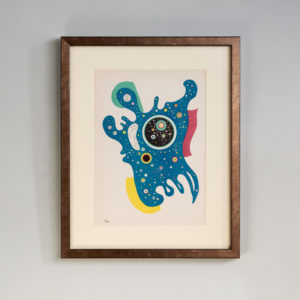
Stars by Wassily Kandinsky, Verve Vol. 1 / No. 2.
£800Stars by Wassily Kandinsky, Verve Vol. 1 / No. 2.
The Verve Review was a purposefully luxurious. It ran from 1937 to 1960, but with only 38 editions available, due to the high degree of design and editorial work dedicated to each issue. Each edition contained unique lithographic prints, commissioned by the editor, and each cover a double-page lithograph elaborated by one of the artists contained within. It was the brainchild of its editor Stratis Eleftheriades, a Greek National who moved to Paris in the early thirties to take part in the growing Modernist movement, writing under the name of Teriade.£800 -
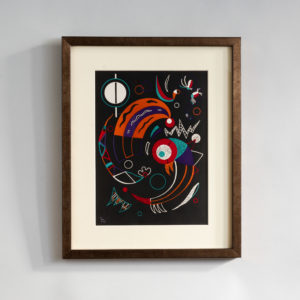
Comets by Wassily Kandinsky, Verve Vol. 1 / No. 2.
£800Comets by Wassily Kandinsky, Verve Vol. 1 / No. 2.
The Verve Review was a purposefully luxurious. It ran from 1937 to 1960, but with only 38 editions available, due to the high degree of design and editorial work dedicated to each issue. Each edition contained unique lithographic prints, commissioned by the editor, and each cover a double-page lithograph elaborated by one of the artists contained within. It was the brainchild of its editor Stratis Eleftheriades, a Greek National who moved to Paris in the early thirties to take part in the growing Modernist movement, writing under the name of Teriade.£800 -
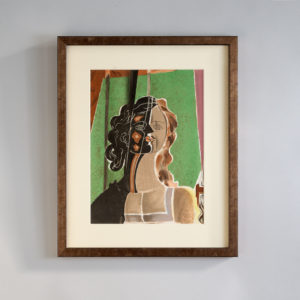
Figure by Georges Braque, Verve Vol 2 / No. 5-6.
£800Figure by Georges Braque, Verve Vol 2 / No. 5-6.
The Verve Review was a purposefully luxurious. It ran from 1937 to 1960, but with only 38 editions available, due to the high degree of design and editorial work dedicated to each issue. Each edition contained unique lithographic prints, commissioned by the editor, and each cover a double-page lithograph elaborated by one of the artists contained within. It was the brainchild of its editor Stratis Eleftheriades, a Greek National who moved to Paris in the early thirties to take part in the growing Modernist movement, writing under the name of Teriade.£800 -
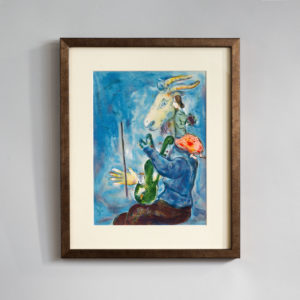
Printemps by Marc Chagall, Verve Vol. 1 / No. 3.
£800Printemps by Marc Chagall, Verve Vol. 1 / No. 3.
The Verve Review was a purposefully luxurious. It ran from 1937 to 1960, but with only 38 editions available, due to the high degree of design and editorial work dedicated to each issue. Each edition contained unique lithographic prints, commissioned by the editor, and each cover a double-page lithograph elaborated by one of the artists contained within. It was the brainchild of its editor Stratis Eleftheriades, a Greek National who moved to Paris in the early thirties to take part in the growing Modernist movement, writing under the name of Teriade.£800 -
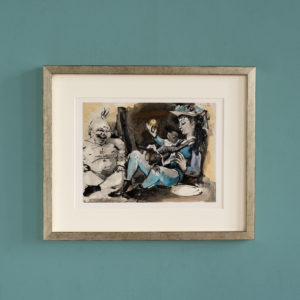
Picasso and the Human Comedy, Verve, Vol. VIII, No 29/30, 1954
£795 eachPicasso and the Human Comedy, Verve, Vol. VIII, No 29/30, 1954
Original lithograph print from Verve Vol. VIII, No 29/30 printed by the Master Printers Mourlot Frères in 1954. Framed in champagne gold with a cream mount.£795 each -
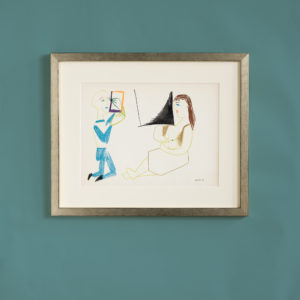
Picasso and the Human Comedy, Verve, Vol. VIII, No 29/30, 1954
£795 eachPicasso and the Human Comedy, Verve, Vol. VIII, No 29/30, 1954
Original lithograph print from Verve Vol. VIII, No 29/30 printed by the Master Printers Mourlot Frères in 1954. Framed in champagne gold with a cream mount.£795 each -
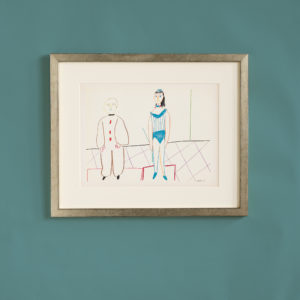
Picasso and the Human Comedy, Verve, Vol. VIII, No 29/30, 1954
£795 eachPicasso and the Human Comedy, Verve, Vol. VIII, No 29/30, 1954
Original lithograph print from Verve Vol. VIII, No 29/30 printed by the Master Printers Mourlot Frères in 1954. Framed in champagne gold with a cream mount.£795 each -
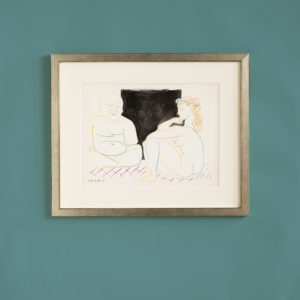
Picasso and the Human Comedy, Verve, Vol. VIII, No 29/30, 1954
£795 eachPicasso and the Human Comedy, Verve, Vol. VIII, No 29/30, 1954
Original lithograph print from Verve Vol. VIII, No 29/30 printed by the Master Printers Mourlot Frères in 1954. Framed in champagne gold with a cream mount.£795 each -
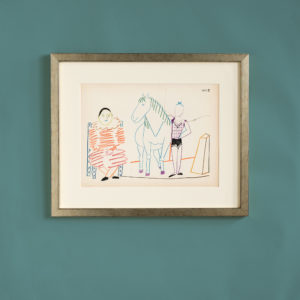
Picasso and the Human Comedy, Verve, Vol. VIII, No 29/30, 1954
£795 eachPicasso and the Human Comedy, Verve, Vol. VIII, No 29/30, 1954
Original lithograph print from Verve Vol. VIII, No 29/30 printed by the Master Printers Mourlot Frères in 1954. Framed in champagne gold with a cream mount.£795 each -
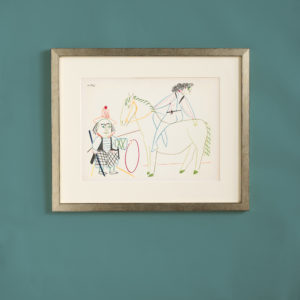
Picasso and the Human Comedy, Verve, Vol. VIII, No 29/30, 1954
£795 eachPicasso and the Human Comedy, Verve, Vol. VIII, No 29/30, 1954
Original lithograph print from Verve Vol. VIII, No 29/30 printed by the Master Printers Mourlot Frères in 1954. Framed in champagne gold with a cream mount.£795 each -
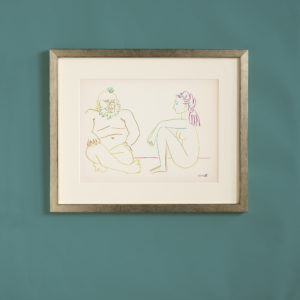
Picasso and the Human Comedy, Verve, Vol. VIII, No 29/30, 1954
£795 eachPicasso and the Human Comedy, Verve, Vol. VIII, No 29/30, 1954
Original lithograph print from Verve Vol. VIII, No 29/30 printed by the Master Printers Mourlot Frères in 1954. Framed in champagne gold with a cream mount.£795 each -
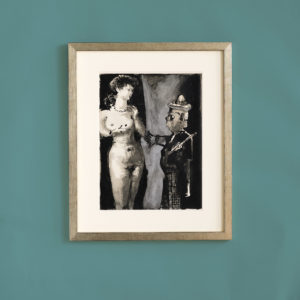
Picasso and the Human Comedy, Verve, Vol. VIII, No 29/30, 1954
£795 eachPicasso and the Human Comedy, Verve, Vol. VIII, No 29/30, 1954
Original lithograph print from Verve Vol. VIII, No 29/30 printed by the Master Printers Mourlot Frères in 1954. Framed in champagne gold with a cream mount.£795 each -
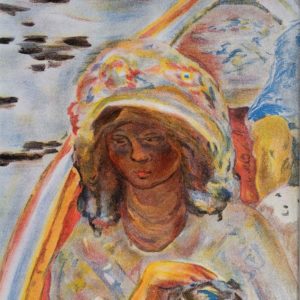
Portrait Fragment by Pierre Bonnard, Verve Vol 2 / No. 5-6.
£600Portrait Fragment by Pierre Bonnard, Verve Vol 2 / No. 5-6.
The Verve Review was a purposefully luxurious. It ran from 1937 to 1960, but with only 38 editions available, due to the high degree of design and editorial work dedicated to each issue. Each edition contained unique lithographic prints, commissioned by the editor, and each cover a double-page lithograph elaborated by one of the artists contained within. It was the brainchild of its editor Stratis Eleftheriades, a Greek National who moved to Paris in the early thirties to take part in the growing Modernist movement, writing under the name of Teriade.£600 -
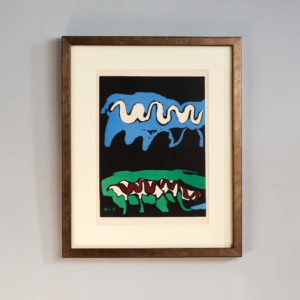
The Four Elements, Earth by Francisco Bores, Verve Vol. 1 / No. 1.
£600The Four Elements, Earth by Francisco Bores, Verve Vol. 1 / No. 1.
The Verve Review was a purposefully luxurious. It ran from 1937 to 1960, but with only 38 editions available, due to the high degree of design and editorial work dedicated to each issue. Each edition contained unique lithographic prints, commissioned by the editor, and each cover a double-page lithograph elaborated by one of the artists contained within. It was the brainchild of its editor Stratis Eleftheriades, a Greek National who moved to Paris in the early thirties to take part in the growing Modernist movement, writing under the name of Teriade.£600 -
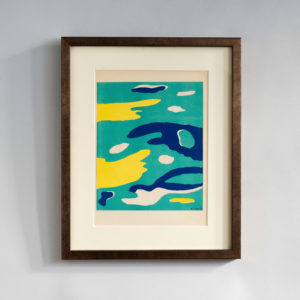
The Four Elements, Water by Fernand Leger, Verve Vol. 1 / No. 1.
£600The Four Elements, Water by Fernand Leger, Verve Vol. 1 / No. 1.
The Verve Review was a purposefully luxurious. It ran from 1937 to 1960, but with only 38 editions available, due to the high degree of design and editorial work dedicated to each issue. Each edition contained unique lithographic prints, commissioned by the editor, and each cover a double-page lithograph elaborated by one of the artists contained within. It was the brainchild of its editor Stratis Eleftheriades, a Greek National who moved to Paris in the early thirties to take part in the growing Modernist movement, writing under the name of Teriade.£600 -
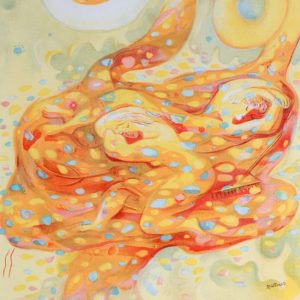
Autumn by Abraham Rattner, Verve Vol. 1 / No. 3.
£600Autumn by Abraham Rattner, Verve Vol. 1 / No. 3.
The Verve Review was a purposefully luxurious. It ran from 1937 to 1960, but with only 38 editions available, due to the high degree of design and editorial work dedicated to each issue. Each edition contained unique lithographic prints, commissioned by the editor, and each cover a double-page lithograph elaborated by one of the artists contained within. It was the brainchild of its editor Stratis Eleftheriades, a Greek National who moved to Paris in the early thirties to take part in the growing Modernist movement, writing under the name of Teriade.£600 -
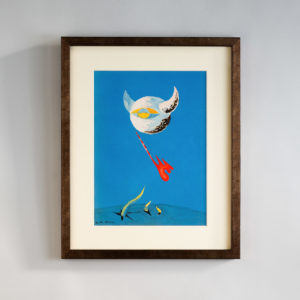
The Moon by André Masson, Verve Vol. 1 / No. 2.
£600The Moon by André Masson, Verve Vol. 1 / No. 2.
The Verve Review was a purposefully luxurious. It ran from 1937 to 1960, but with only 38 editions available, due to the high degree of design and editorial work dedicated to each issue. Each edition contained unique lithographic prints, commissioned by the editor, and each cover a double-page lithograph elaborated by one of the artists contained within. It was the brainchild of its editor Stratis Eleftheriades, a Greek National who moved to Paris in the early thirties to take part in the growing Modernist movement, writing under the name of Teriade.£600 -
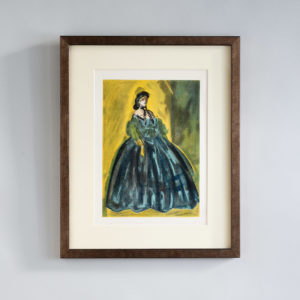
Portraits Part II by Constantin Guys, Verve Vol 2 / No. 5-6.
£500Portraits Part II by Constantin Guys, Verve Vol 2 / No. 5-6.
The Verve Review was a purposefully luxurious. It ran from 1937 to 1960, but with only 38 editions available, due to the high degree of design and editorial work dedicated to each issue. Each edition contained unique lithographic prints, commissioned by the editor, and each cover a double-page lithograph elaborated by one of the artists contained within. It was the brainchild of its editor Stratis Eleftheriades, a Greek National who moved to Paris in the early thirties to take part in the growing Modernist movement, writing under the name of Teriade.£500 -
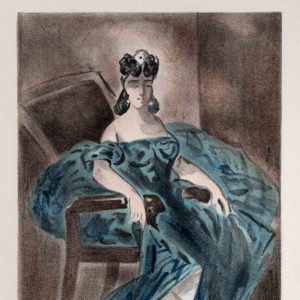
Portraits Part I by Constantin Guys, Verve Vol 2 / No. 5-6.
£500Portraits Part I by Constantin Guys, Verve Vol 2 / No. 5-6.
The Verve Review was a purposefully luxurious. It ran from 1937 to 1960, but with only 38 editions available, due to the high degree of design and editorial work dedicated to each issue. Each edition contained unique lithographic prints, commissioned by the editor, and each cover a double-page lithograph elaborated by one of the artists contained within. It was the brainchild of its editor Stratis Eleftheriades, a Greek National who moved to Paris in the early thirties to take part in the growing Modernist movement, writing under the name of Teriade.£500 -
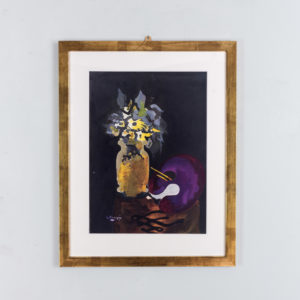
George Braque lithograph published for Verve, vol. VIII No 31/32
£450 eachGeorge Braque lithograph published for Verve, vol. VIII No 31/32
Original lithograph, published 1955 for Verve, vol. VIII No 31/32, The Intimate Sketchbooks of G. Braque. Gilt framed.£450 each -
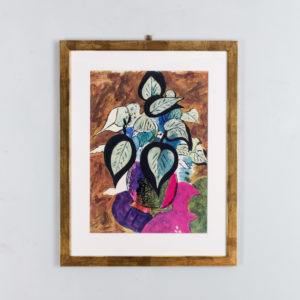
George Braque lithograph published for Verve, vol. VIII No 31/32
£450 eachGeorge Braque lithograph published for Verve, vol. VIII No 31/32
Original lithograph, published 1955 for Verve, vol. VIII No 31/32, The Intimate Sketchbooks of G. Braque. Gilt framed.£450 each -
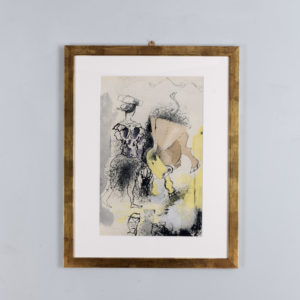
George Braque lithograph published for Verve, vol. VIII No 31/32
£450 eachGeorge Braque lithograph published for Verve, vol. VIII No 31/32
Original lithograph, published 1955 for Verve, vol. VIII No 31/32, The Intimate Sketchbooks of G. Braque. Gilt framed.£450 each -
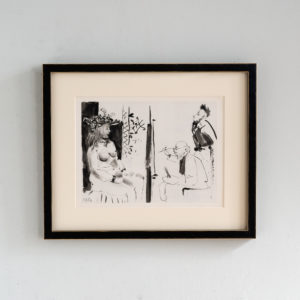
Picasso, Verve 1954
£295Picasso, Verve 1954
Original héliogravure print from Verve Vol. VIII, No 29/30 printed by the Master Printers Draeger Frères in 1954. Framed in black with a cream mount.£295 -
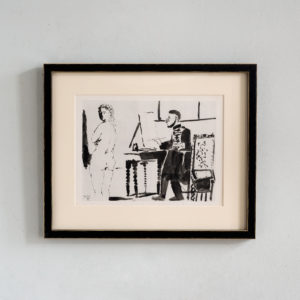
Picasso, Verve 1954
£295Picasso, Verve 1954
Original héliogravure print from Verve Vol. VIII, No 29/30 printed by the Master Printers Draeger Frères in 1954. Framed in black with a cream mount.£295 -
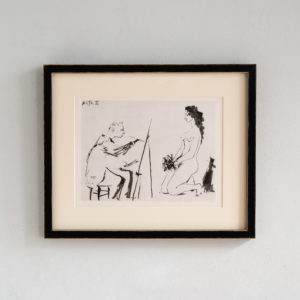
Picasso, Verve 1954
£295Picasso, Verve 1954
Original héliogravure print from Verve Vol. VIII, No 29/30 printed by the Master Printers Draeger Frères in 1954. Framed in black with a cream mount.£295 -
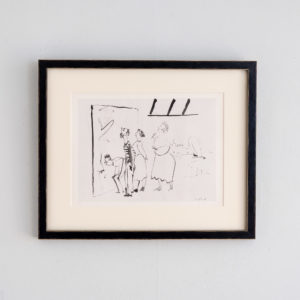
Picasso, Verve 1954
£295Picasso, Verve 1954
Original héliogravure print from Verve Vol. VIII, No 29/30 printed by the Master Printers Draeger Frères in 1954. Framed in black with a cream mount.£295 -
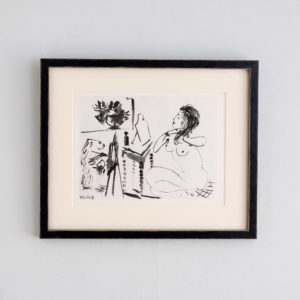
Picasso, Verve 1954
£295Picasso, Verve 1954
Original héliogravure print from Verve Vol. VIII, No 29/30 printed by the Master Printers Draeger Frères in 1954. Framed in black with a cream mount.£295 -
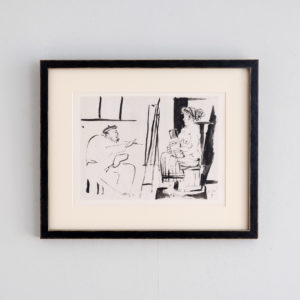
Picasso, Verve 1954
£295Picasso, Verve 1954
Original héliogravure print from Verve Vol. VIII, No 29/30 printed by the Master Printers Draeger Frères in 1954. Framed in black with a cream mount.£295 -
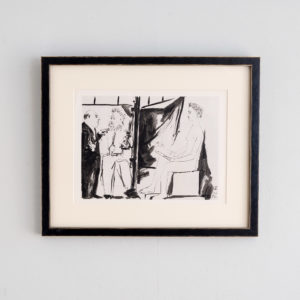
Picasso, Verve 1954
£295Picasso, Verve 1954
Original héliogravure print from Verve Vol. VIII, No 29/30 printed by the Master Printers Draeger Frères in 1954. Framed in black with a cream mount.£295 -
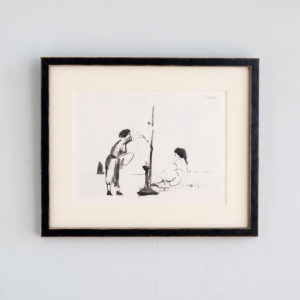
Picasso, Verve 1954
£295Picasso, Verve 1954
Original heliograuvre print from Verve Vol. VIII, No 29/30 printed by the Master Printers Draeger Frères in 1954. Framed in black with a cream mount.£295 -
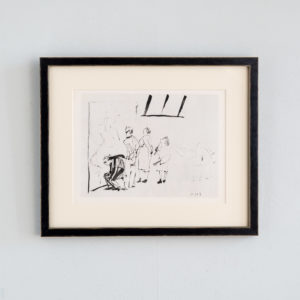
Picasso, Verve 1954
£295Picasso, Verve 1954
Original héliogravure print from Verve Vol. VIII, No 29/30 printed by the Master Printers Draeger Frères in 1954. Framed in black with a cream mount.£295 -
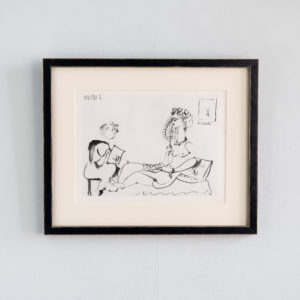
Picasso, Verve 1954
£295Picasso, Verve 1954
Original héliogravure print from Verve Vol. VIII, No 29/30 printed by the Master Printers Draeger Frères in 1954. Framed in black with a cream mount.£295 -
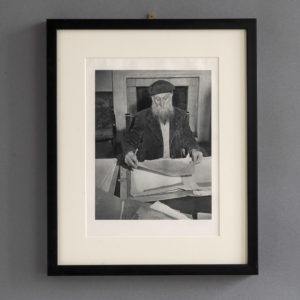
Photographs from Verve, December 1937. Portrait of Aristide Maillol
£250 eachPhotographs from Verve, December 1937. Portrait of Aristide Maillol
The Verve Review, from its very inception, was a purposefully luxurious art publication. It ran from 1937 to 1960, but for only 38 editions, due to the high degree of design and editorial work dedicated to each issue. Its editor was Stratis Eleftheriades, a Greek National who moved to Paris in the early thirties to take part in the growing Modernist movement, writing under the name of Teriade. As an art critic, patron and gallery owner he commissioned various individuals, artists, photographers and philosophers to contribute to it. Héliogravure is a process for printing photographs that was developed in the first half of the 19th century. It is a photo-mechanical process whereby a copper plate is grained and then coated with a light-sensitive gelatin tissue which had been exposed to a film positive, and then etched, resulting in a high-quality intaglio plate that can reproduce detailed continuous tones of a photograph.£250 each -
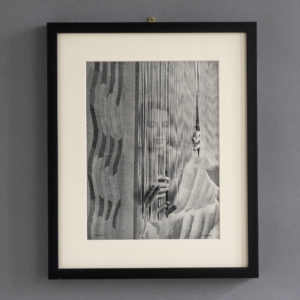
Photographs from Verve, December 1937. Gobelins / Makowska
£250 eachPhotographs from Verve, December 1937. Gobelins / Makowska
The Verve Review, from its very inception, was a purposefully luxurious art publication. It ran from 1937 to 1960, but for only 38 editions, due to the high degree of design and editorial work dedicated to each issue. Its editor was Stratis Eleftheriades, a Greek National who moved to Paris in the early thirties to take part in the growing Modernist movement, writing under the name of Teriade. As an art critic, patron and gallery owner he commissioned various individuals, artists, photographers and philosophers to contribute to it. Héliogravure is a process for printing photographs that was developed in the first half of the 19th century. It is a photo-mechanical process whereby a copper plate is grained and then coated with a light-sensitive gelatin tissue which had been exposed to a film positive, and then etched, resulting in a high-quality intaglio plate that can reproduce detailed continuous tones of a photograph.£250 each -
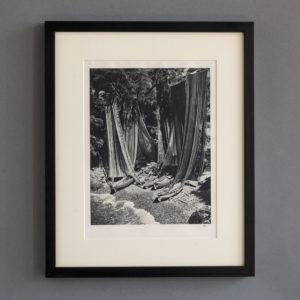
Photographs from Verve, December 1937. Gil
£250 eachPhotographs from Verve, December 1937. Gil
The Verve Review, from its very inception, was a purposefully luxurious art publication. It ran from 1937 to 1960, but for only 38 editions, due to the high degree of design and editorial work dedicated to each issue. Its editor was Stratis Eleftheriades, a Greek National who moved to Paris in the early thirties to take part in the growing Modernist movement, writing under the name of Teriade. As an art critic, patron and gallery owner he commissioned various individuals, artists, photographers and philosophers to contribute to it. Héliogravure is a process for printing photographs that was developed in the first half of the 19th century. It is a photo-mechanical process whereby a copper plate is grained and then coated with a light-sensitive gelatin tissue which had been exposed to a film positive, and then etched, resulting in a high-quality intaglio plate that can reproduce detailed continuous tones of a photograph.£250 each -
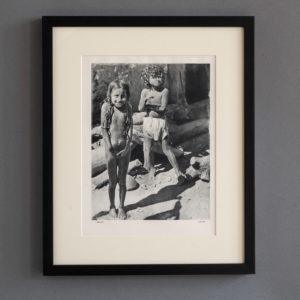
Photographs from Verve, December 1937. Henri Cartier-Bresson
£250 eachPhotographs from Verve, December 1937. Henri Cartier-Bresson
The Verve Review, from its very inception, was a purposefully luxurious art publication. It ran from 1937 to 1960, but for only 38 editions, due to the high degree of design and editorial work dedicated to each issue. Its editor was Stratis Eleftheriades, a Greek National who moved to Paris in the early thirties to take part in the growing Modernist movement, writing under the name of Teriade. As an art critic, patron and gallery owner he commissioned various individuals, artists, photographers and philosophers to contribute to it. Héliogravure is a process for printing photographs that was developed in the first half of the 19th century. It is a photo-mechanical process whereby a copper plate is grained and then coated with a light-sensitive gelatin tissue which had been exposed to a film positive, and then etched, resulting in a high-quality intaglio plate that can reproduce detailed continuous tones of a photograph.£250 each -
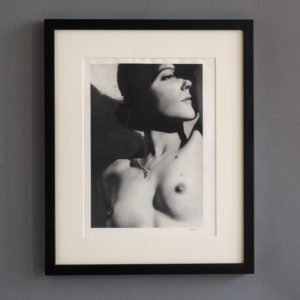
Photographs from Verve, December 1937. Man Ray
£250 eachPhotographs from Verve, December 1937. Man Ray
The Verve Review, from its very inception, was a purposefully luxurious art publication. It ran from 1937 to 1960, but for only 38 editions, due to the high degree of design and editorial work dedicated to each issue. Its editor was Stratis Eleftheriades, a Greek National who moved to Paris in the early thirties to take part in the growing Modernist movement, writing under the name of Teriade. As an art critic, patron and gallery owner he commissioned various individuals, artists, photographers and philosophers to contribute to it. Héliogravure is a process for printing photographs that was developed in the first half of the 19th century. It is a photo-mechanical process whereby a copper plate is grained and then coated with a light-sensitive gelatin tissue which had been exposed to a film positive, and then etched, resulting in a high-quality intaglio plate that can reproduce detailed continuous tones of a photograph.£250 each -
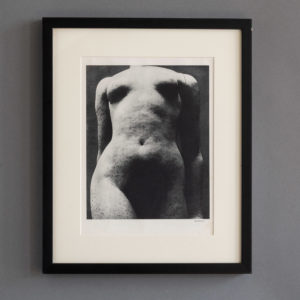
Photographs from Verve, December 1937. Erwin Blumenfeld
£250 eachPhotographs from Verve, December 1937. Erwin Blumenfeld
The Verve Review, from its very inception, was a purposefully luxurious art publication. It ran from 1937 to 1960, but for only 38 editions, due to the high degree of design and editorial work dedicated to each issue. Its editor was Stratis Eleftheriades, a Greek National who moved to Paris in the early thirties to take part in the growing Modernist movement, writing under the name of Teriade. As an art critic, patron and gallery owner he commissioned various individuals, artists, photographers and philosophers to contribute to it. Héliogravure is a process for printing photographs that was developed in the first half of the 19th century. It is a photo-mechanical process whereby a copper plate is grained and then coated with a light-sensitive gelatin tissue which had been exposed to a film positive, and then etched, resulting in a high-quality intaglio plate that can reproduce detailed continuous tones of a photograph.£250 each -
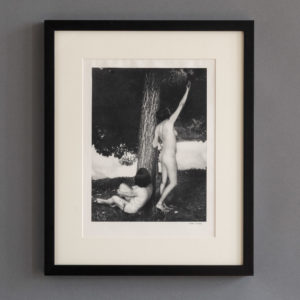
Photographs from Verve, December 1937. Nora Dumas
£250 eachPhotographs from Verve, December 1937. Nora Dumas
The Verve Review, from its very inception, was a purposefully luxurious art publication. It ran from 1937 to 1960, but for only 38 editions, due to the high degree of design and editorial work dedicated to each issue. Its editor was Stratis Eleftheriades, a Greek National who moved to Paris in the early thirties to take part in the growing Modernist movement, writing under the name of Teriade. As an art critic, patron and gallery owner he commissioned various individuals, artists, photographers and philosophers to contribute to it. Héliogravure is a process for printing photographs that was developed in the first half of the 19th century. It is a photo-mechanical process whereby a copper plate is grained and then coated with a light-sensitive gelatin tissue which had been exposed to a film positive, and then etched, resulting in a high-quality intaglio plate that can reproduce detailed continuous tones of a photograph.£250 each -
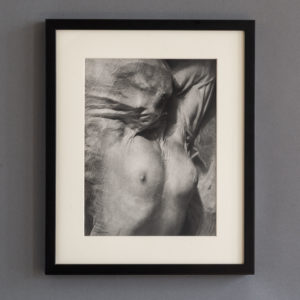
Photographs from Verve, December 1937. Erwin Blumenfeld
£250 eachPhotographs from Verve, December 1937. Erwin Blumenfeld
The Verve Review, from its very inception, was a purposefully luxurious art publication. It ran from 1937 to 1960, but for only 38 editions, due to the high degree of design and editorial work dedicated to each issue. Its editor was Stratis Eleftheriades, a Greek National who moved to Paris in the early thirties to take part in the growing Modernist movement, writing under the name of Teriade. As an art critic, patron and gallery owner he commissioned various individuals, artists, photographers and philosophers to contribute to it. Héliogravure is a process for printing photographs that was developed in the first half of the 19th century. It is a photo-mechanical process whereby a copper plate is grained and then coated with a light-sensitive gelatin tissue which had been exposed to a film positive, and then etched, resulting in a high-quality intaglio plate that can reproduce detailed continuous tones of a photograph.£250 each -
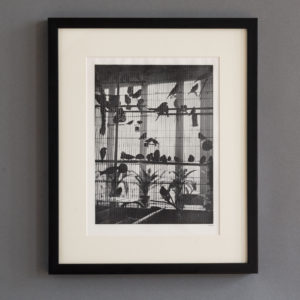
Photographs from Verve, December 1937. Brassaï
£250 eachPhotographs from Verve, December 1937. Brassaï
The Verve Review, from its very inception, was a purposefully luxurious art publication. It ran from 1937 to 1960, but for only 38 editions, due to the high degree of design and editorial work dedicated to each issue. Its editor was Stratis Eleftheriades, a Greek National who moved to Paris in the early thirties to take part in the growing Modernist movement, writing under the name of Teriade. As an art critic, patron and gallery owner he commissioned various individuals, artists, photographers and philosophers to contribute to it. Héliogravure is a process for printing photographs that was developed in the first half of the 19th century. It is a photo-mechanical process whereby a copper plate is grained and then coated with a light-sensitive gelatin tissue which had been exposed to a film positive, and then etched, resulting in a high-quality intaglio plate that can reproduce detailed continuous tones of a photograph.£250 each -
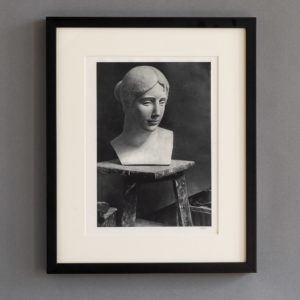
Photographs from Verve, December 1937. Brassaï
£250 eachPhotographs from Verve, December 1937. Brassaï
The Verve Review, from its very inception, was a purposefully luxurious art publication. It ran from 1937 to 1960, but for only 38 editions, due to the high degree of design and editorial work dedicated to each issue. Its editor was Stratis Eleftheriades, a Greek National who moved to Paris in the early thirties to take part in the growing Modernist movement, writing under the name of Teriade. As an art critic, patron and gallery owner he commissioned various individuals, artists, photographers and philosophers to contribute to it. Héliogravure is a process for printing photographs that was developed in the first half of the 19th century. It is a photo-mechanical process whereby a copper plate is grained and then coated with a light-sensitive gelatin tissue which had been exposed to a film positive, and then etched, resulting in a high-quality intaglio plate that can reproduce detailed continuous tones of a photograph.£250 each -
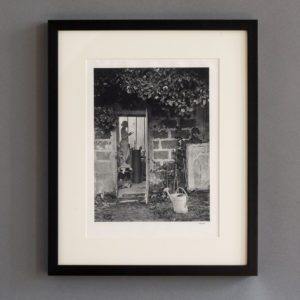
Photographs from Verve, December 1937. Brassaï
£250 eachPhotographs from Verve, December 1937. Brassaï
The Verve Review, from its very inception, was a purposefully luxurious art publication. It ran from 1937 to 1960, but for only 38 editions, due to the high degree of design and editorial work dedicated to each issue. Its editor was Stratis Eleftheriades, a Greek National who moved to Paris in the early thirties to take part in the growing Modernist movement, writing under the name of Teriade. As an art critic, patron and gallery owner he commissioned various individuals, artists, photographers and philosophers to contribute to it. Héliogravure is a process for printing photographs that was developed in the first half of the 19th century. It is a photo-mechanical process whereby a copper plate is grained and then coated with a light-sensitive gelatin tissue which had been exposed to a film positive, and then etched, resulting in a high-quality intaglio plate that can reproduce detailed continuous tones of a photograph.£250 each -
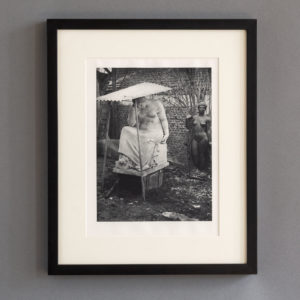
Photographs from Verve, December 1937. Brassaï
£250 eachPhotographs from Verve, December 1937. Brassaï
The Verve Review, from its very inception, was a purposefully luxurious art publication. It ran from 1937 to 1960, but for only 38 editions, due to the high degree of design and editorial work dedicated to each issue. Its editor was Stratis Eleftheriades, a Greek National who moved to Paris in the early thirties to take part in the growing Modernist movement, writing under the name of Teriade. As an art critic, patron and gallery owner he commissioned various individuals, artists, photographers and philosophers to contribute to it. Héliogravure is a process for printing photographs that was developed in the first half of the 19th century. It is a photo-mechanical process whereby a copper plate is grained and then coated with a light-sensitive gelatin tissue which had been exposed to a film positive, and then etched, resulting in a high-quality intaglio plate that can reproduce detailed continuous tones of a photograph.£250 each -
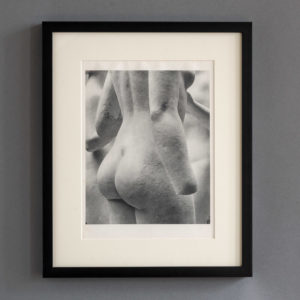
Photographs from Verve, December 1937. Brassaï
£250 eachPhotographs from Verve, December 1937. Brassaï
The Verve Review, from its very inception, was a purposefully luxurious art publication. It ran from 1937 to 1960, but for only 38 editions, due to the high degree of design and editorial work dedicated to each issue. Its editor was Stratis Eleftheriades, a Greek National who moved to Paris in the early thirties to take part in the growing Modernist movement, writing under the name of Teriade. As an art critic, patron and gallery owner he commissioned various individuals, artists, photographers and philosophers to contribute to it. Héliogravure is a process for printing photographs that was developed in the first half of the 19th century. It is a photo-mechanical process whereby a copper plate is grained and then coated with a light-sensitive gelatin tissue which had been exposed to a film positive, and then etched, resulting in a high-quality intaglio plate that can reproduce detailed continuous tones of a photograph.£250 each -

Photographs from Verve, December 1937. Brassaï
£250 eachPhotographs from Verve, December 1937. Brassaï
The Verve Review, from its very inception, was a purposefully luxurious art publication. It ran from 1937 to 1960, but for only 38 editions, due to the high degree of design and editorial work dedicated to each issue. Its editor was Stratis Eleftheriades, a Greek National who moved to Paris in the early thirties to take part in the growing Modernist movement, writing under the name of Teriade. As an art critic, patron and gallery owner he commissioned various individuals, artists, photographers and philosophers to contribute to it. Héliogravure is a process for printing photographs that was developed in the first half of the 19th century. It is a photo-mechanical process whereby a copper plate is grained and then coated with a light-sensitive gelatin tissue which had been exposed to a film positive, and then etched, resulting in a high-quality intaglio plate that can reproduce detailed continuous tones of a photograph.£250 each -
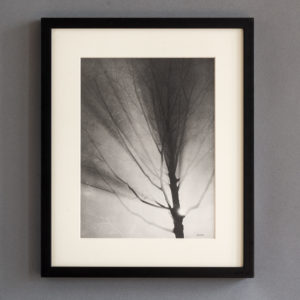
Photographs from Verve, December 1937. Brassaï
£250 eachPhotographs from Verve, December 1937. Brassaï
The Verve Review, from its very inception, was a purposefully luxurious art publication. It ran from 1937 to 1960, but for only 38 editions, due to the high degree of design and editorial work dedicated to each issue. Its editor was Stratis Eleftheriades, a Greek National who moved to Paris in the early thirties to take part in the growing Modernist movement, writing under the name of Teriade. As an art critic, patron and gallery owner he commissioned various individuals, artists, photographers and philosophers to contribute to it. Héliogravure is a process for printing photographs that was developed in the first half of the 19th century. It is a photo-mechanical process whereby a copper plate is grained and then coated with a light-sensitive gelatin tissue which had been exposed to a film positive, and then etched, resulting in a high-quality intaglio plate that can reproduce detailed continuous tones of a photograph.£250 each -
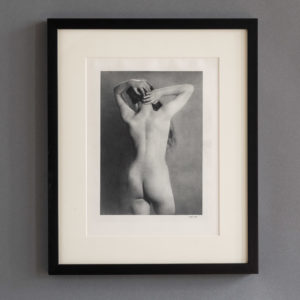
Photographs from Verve, December 1937. Man Ray
£250 eachPhotographs from Verve, December 1937. Man Ray
The Verve Review, from its very inception, was a purposefully luxurious art publication. It ran from 1937 to 1960, but for only 38 editions, due to the high degree of design and editorial work dedicated to each issue. Its editor was Stratis Eleftheriades, a Greek National who moved to Paris in the early thirties to take part in the growing Modernist movement, writing under the name of Teriade. As an art critic, patron and gallery owner he commissioned various individuals, artists, photographers and philosophers to contribute to it. Héliogravure is a process for printing photographs that was developed in the first half of the 19th century. It is a photo-mechanical process whereby a copper plate is grained and then coated with a light-sensitive gelatin tissue which had been exposed to a film positive, and then etched, resulting in a high-quality intaglio plate that can reproduce detailed continuous tones of a photograph.£250 each -
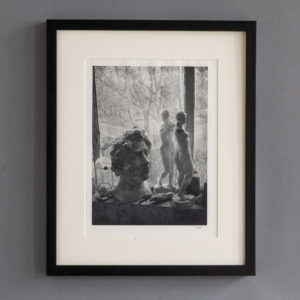
Photographs from Verve, December 1937. Brassaï
£250 eachPhotographs from Verve, December 1937. Brassaï
The Verve Review, from its very inception, was a purposefully luxurious art publication. It ran from 1937 to 1960, but for only 38 editions, due to the high degree of design and editorial work dedicated to each issue. Its editor was Stratis Eleftheriades, a Greek National who moved to Paris in the early thirties to take part in the growing Modernist movement, writing under the name of Teriade. As an art critic, patron and gallery owner he commissioned various individuals, artists, photographers and philosophers to contribute to it. Héliogravure is a process for printing photographs that was developed in the first half of the 19th century. It is a photo-mechanical process whereby a copper plate is grained and then coated with a light-sensitive gelatin tissue which had been exposed to a film positive, and then etched, resulting in a high-quality intaglio plate that can reproduce detailed continuous tones of a photograph.£250 each -
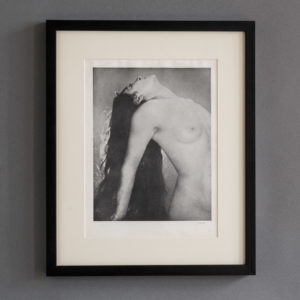
Photographs from Verve, December 1937. Man Ray
£250 eachPhotographs from Verve, December 1937. Man Ray
The Verve Review, from its very inception, was a purposefully luxurious art publication. It ran from 1937 to 1960, but for only 38 editions, due to the high degree of design and editorial work dedicated to each issue. Its editor was Stratis Eleftheriades, a Greek National who moved to Paris in the early thirties to take part in the growing Modernist movement, writing under the name of Teriade. As an art critic, patron and gallery owner he commissioned various individuals, artists, photographers and philosophers to contribute to it. Héliogravure is a process for printing photographs that was developed in the first half of the 19th century. It is a photo-mechanical process whereby a copper plate is grained and then coated with a light-sensitive gelatin tissue which had been exposed to a film positive, and then etched, resulting in a high-quality intaglio plate that can reproduce detailed continuous tones of a photograph.£250 each
Featured Items
-

Portraits Part II by Constantin Guys, Verve Vol 2 / No. 5-6.
£500Portraits Part II by Constantin Guys, Verve Vol 2 / No. 5-6.
The Verve Review was a purposefully luxurious. It ran from 1937 to 1960, but with only 38 editions available, due to the high degree of design and editorial work dedicated to each issue. Each edition contained unique lithographic prints, commissioned by the editor, and each cover a double-page lithograph elaborated by one of the artists contained within. It was the brainchild of its editor Stratis Eleftheriades, a Greek National who moved to Paris in the early thirties to take part in the growing Modernist movement, writing under the name of Teriade.£500 -

Printemps by Marc Chagall, Verve Vol. 1 / No. 3.
£800Printemps by Marc Chagall, Verve Vol. 1 / No. 3.
The Verve Review was a purposefully luxurious. It ran from 1937 to 1960, but with only 38 editions available, due to the high degree of design and editorial work dedicated to each issue. Each edition contained unique lithographic prints, commissioned by the editor, and each cover a double-page lithograph elaborated by one of the artists contained within. It was the brainchild of its editor Stratis Eleftheriades, a Greek National who moved to Paris in the early thirties to take part in the growing Modernist movement, writing under the name of Teriade.£800 -

Autumn by Abraham Rattner, Verve Vol. 1 / No. 3.
£600Autumn by Abraham Rattner, Verve Vol. 1 / No. 3.
The Verve Review was a purposefully luxurious. It ran from 1937 to 1960, but with only 38 editions available, due to the high degree of design and editorial work dedicated to each issue. Each edition contained unique lithographic prints, commissioned by the editor, and each cover a double-page lithograph elaborated by one of the artists contained within. It was the brainchild of its editor Stratis Eleftheriades, a Greek National who moved to Paris in the early thirties to take part in the growing Modernist movement, writing under the name of Teriade.£600 -

Portraits Part I by Constantin Guys, Verve Vol 2 / No. 5-6.
£500Portraits Part I by Constantin Guys, Verve Vol 2 / No. 5-6.
The Verve Review was a purposefully luxurious. It ran from 1937 to 1960, but with only 38 editions available, due to the high degree of design and editorial work dedicated to each issue. Each edition contained unique lithographic prints, commissioned by the editor, and each cover a double-page lithograph elaborated by one of the artists contained within. It was the brainchild of its editor Stratis Eleftheriades, a Greek National who moved to Paris in the early thirties to take part in the growing Modernist movement, writing under the name of Teriade.£500
